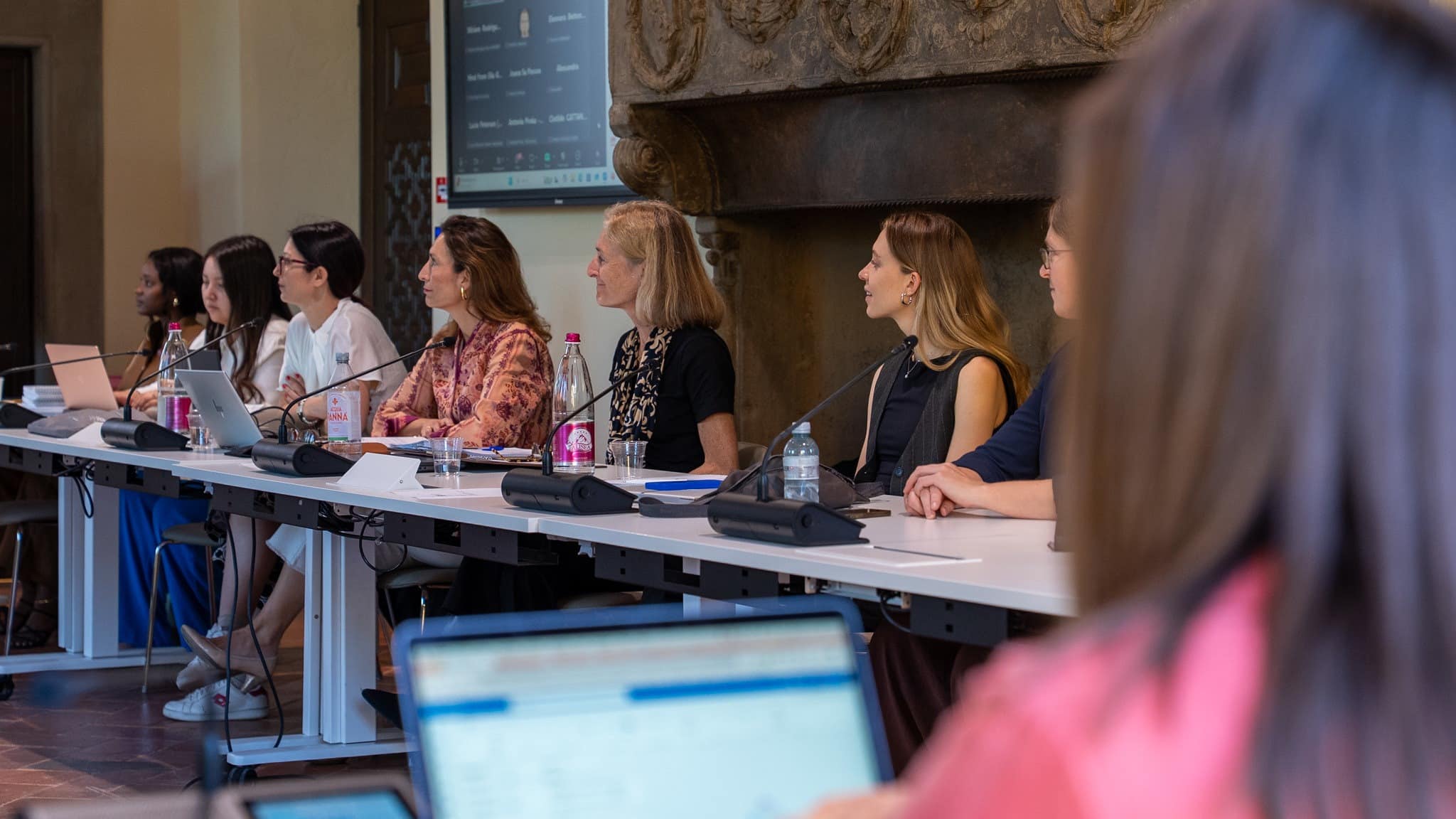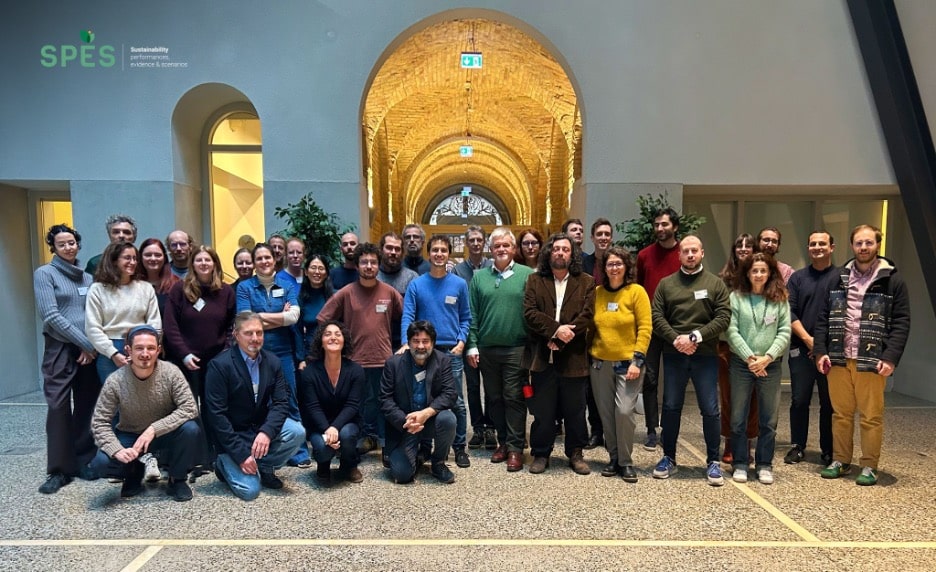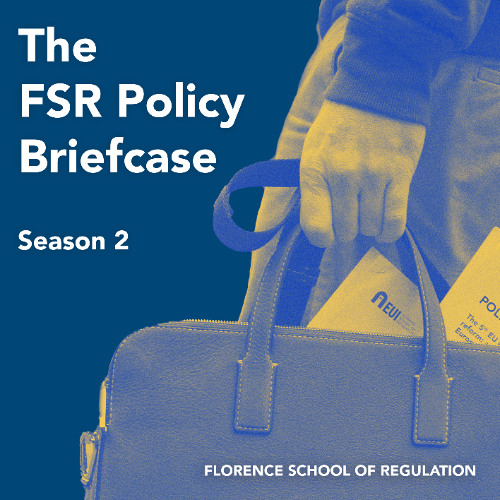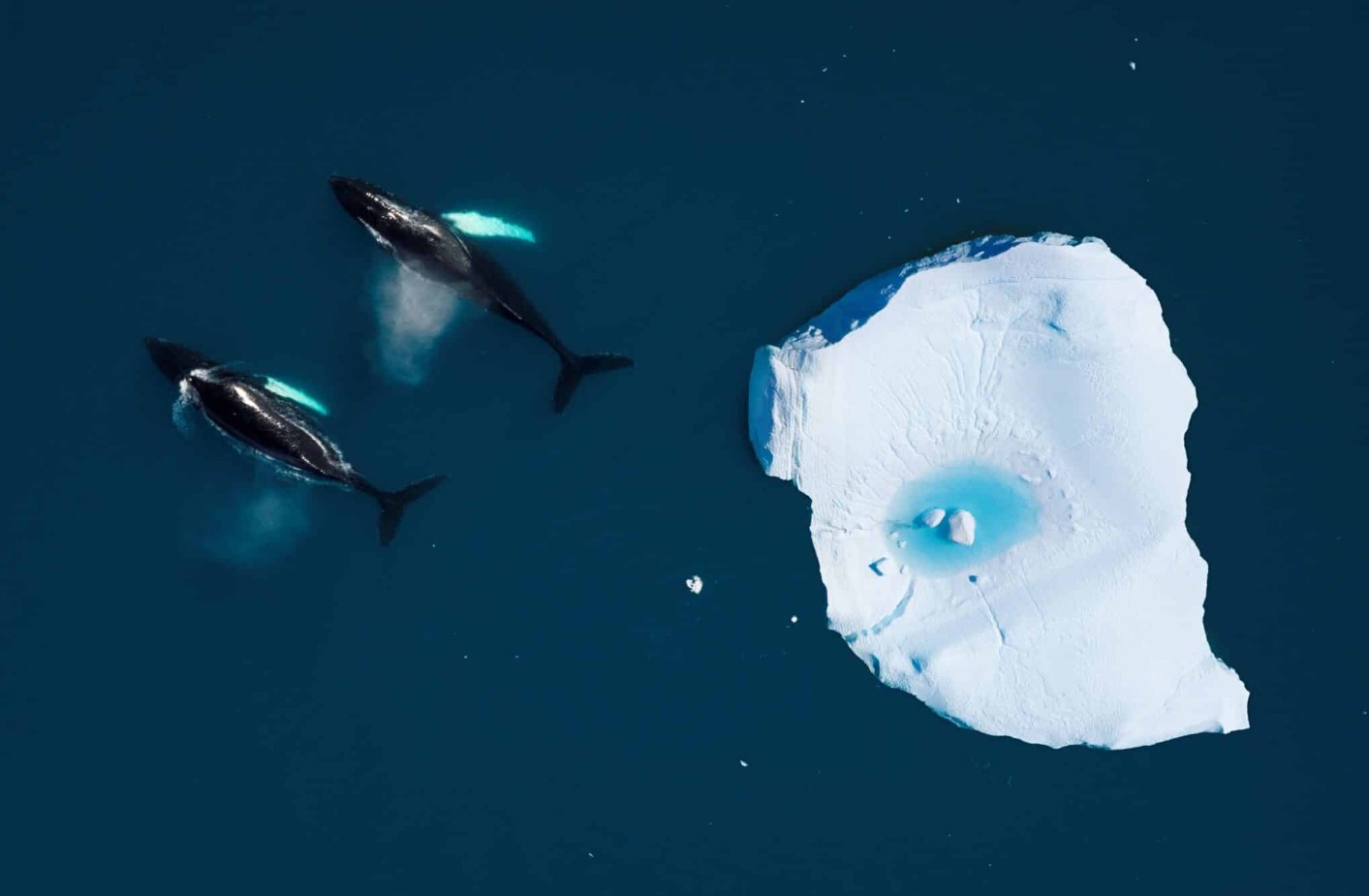Championing climate justice and green innovation: meet Prof Ginevra Le Moli, FSR
News and insights from the FSR faculty

The FSR is an academic institution committed to addressing today’s most pressing global challenges via interdisciplinary research and policy dialogue. At the heart of this mission are researchers like Ginevra le Moli, a part-time professor at the FSR, whose expertise and passion push the boundaries of our understanding and impact. Through her diverse and inspiring work—from advising on climate change obligations at the International Court of Justice to contributing to transformative green policies in the EU—Ginevra exemplifies the FSR’s ethos of making research actionable and relevant.
Meet Prof Ginevra Le Moli
In this interview, we delve into her recent projects, explore her vision for the future of environmental governance, and celebrate her leadership in fostering meaningful connections between academia, policy, and practice. Join us in discovering how Ginevra’s journey and insights are shaping the future of sustainable development and climate justice.
The African Union delegation
Hi Ginevra, you recently acted as part of the African Union delegation in the advisory proceedings concerning ‘Obligations of States in respect of climate change’ before the International Court of Justice. Could you explain the purpose of these proceedings?
The request for an advisory opinion concerning the ‘Obligations of States in respect of Climate Change’ was made by the UN General Assembly (UNGA) pursuant to Resolution 77/276 of 29 March 2024. The UNGA requested the Court to give an advisory opinion on the following questions:
“Having particular regard to the Charter of the United Nations, the International Covenant on Civil and Political Rights, the International Covenant on Economic, Social and Cultural Rights, the United Nations Framework Convention on Climate Change, the Paris Agreement, the United Nations Convention on the Law of the Sea, the duty of due diligence, the rights recognized in the Universal Declaration of Human Rights, the principle of prevention of significant harm to the environment and the duty to protect and preserve the marine environment,
- What are the obligations of States under international law to ensure the protection of theclimate system and other parts of the environment from anthropogenic emissions of greenhouse gases for States and for present and future generations;
- What are the legal consequences under these obligations for States where they, by their acts and omissions, have caused significant harm to the climate system and other parts of the environment, with respect to:
-
- States, including, in particular, small island developing States, which due to their geographical circumstances and level of development, are injured or specially affected by or are particularly vulnerable to the adverse effects of climate change?
- Peoples and individuals of the present and future generations affected by the adverse effects of climate change?”
There is now scientific consensus, expressed in the latest report of the IPCC, in wording approved by consensus by the States members of the IPCC, that: ‘Human activities, principally through emissions of greenhouse gases, have unequivocally caused global warming, with global surface temperature reaching 1.1°C above 1850–1900 in 2011–2020’.[1] There is also scientific consensus on the fact that there is a rapidly closing window for effective action. In a context of climate emergency, where the need for bold and immediate action could not be clearer and, yet, protracted negotiations under the UNFCCC and the Paris Agreement are not delivering what is necessary, clarity on what the body of international law requires is paramount. This is why the UNGA adopted by consensus the UNGA Resolution asking the Court to state what action is required by international law as a whole in a context of climate emergency, and what are the consequences of inaction.
The Republic of Vanuatu has been leading the efforts in this respect to ensure that the Court takes a clear position on the issue of climate justice, which boiled down to its essential content means that “[v]ulnerable communities who have historically contributed the least to current climate change are disproportionately affected”. the questions ask the Court whether the conduct that has taken humanity to the brink of collapse, i.e. the cumulative emissions of greenhouse gases of certain States over a period of more than a century, is inconsistent with the obligations of States under international law as a whole and, if the answer is yes, then what are the legal consequences with respect to those most affected. This question is simple and can be given a straight principled answer: the conduct responsible for the gravest pollution of all is, in principle, unlawful and any State responsible for it – past, present or future – must cease such conduct and repair its consequences.
In the first written phase of these proceedings, 91 written statements were filed with the Registry of the Court, which according to the Court’s press release No 2024/31 of 12 April 2024 is ‘the highest number of written statements ever to have been filed in advisory proceedings before the Court’. These proceedings are historical. It is significant that, for numerous States and intergovernmental organisations, this was the first time they participated in proceedings before the Court. It is also significant that many non-governmental organisations, including youth organisations, also made submission. Public oral hearings have began on Monday 2 December and will end on Friday 13 December. 98 States and 12 international organisations have expressed their intention to participate in the oral proceedings before the Court. The hearings are streamed live and can be accessed on the Court’s website and on UN Web TV.
In the written and oral proceedings, I acted as part of the legal team representing the African Union (AU), led by the AU Legal Counsel Prof. Hajer Gueldich and Prof. Makane Mbengue.. Due to their unique geographical characteristics and level of economic development, African States have been and continue to be particularly vulnerable and specially affected by the adverse effects of climate change, while their historical contribution to GHG emissions has been negligible. The African Union argued that acts and omissions of States causing significant harm to the climate system and to the environment constitute a breach of international law.
It also argued that States that have committed these internationally wrongful acts continue to have a duty to comply with the existing international framework, including all obligations under international customary law and the global and regional instruments that protect the climate system and other parts of the environment for present and future generations. In addition to that continued duty of performance, States are under an obligation to cease these wrongful acts, and to offer appropriate assurances and guarantees of non-repetition. The African Union further submitted that States these internationally wrongful acts entail obligations to make full reparation for the injuries caused. The continued emission of GHGs by developed States in violation of international law have produced environmental damages, which are especially felt by Least Developed Countries and Small Islands Developing States, including in Africa. In particular, such reparation could take the form of debt cancellation – or debt relief – and financial assistance, capacity-building, and technology transfer for adaptation.
Global Race to the (Green) Top
You have recently also co-authored a journal article titled ‘The Next Generation EU Program in the “Global Race to the (Green) Top”’, published on the American Journal of International Law (AJIL) Unbound. Is the Next Generation EU Program delivering on its “green” objectives and how you see its role in the future?
The NGEU program was designed to support, in part, the EU Green Deal and, later on, to support the EU’s response to the energy crisis triggered by the Russian invasion of Ukraine. The NGEU recovery plan and the NGEU Green Bond program must be seen as components of the EU’s industrial competition strategy.
The actual expenditures of the NGEU green bond framework suggest that such is the focus on NGEU green mandates. Indeed, out of the nine sectors where proceeds from green bonds can be spent, the spending is flowing mainly to three green transformation sectors, which account for some 75 percent of the EU green bonds eligible expenditures: (1) clean transport and infrastructure (33.9 percent); (2) energy efficiency (25.8 percent); and (3) clean energy and network (16.4 percent). Other sectors account for lower percentages, namely: (1) water and waste management (6.4 percent); (2) climate change adaptation (6.2 percent); (3) research and innovation supporting the green transition (5.8 percent); and (4) others (2.2 percent). Whereas mitigation is also an objective of this measure, the greenhouse gas (GHG) emission reductions that would be reduced from the full implementation until 2026 of activities financed from green bonds is relatively small and in the region of 1.2 percent of EU emissions in 2022. This suggests that, whereas the objective of GHG emissions reduction is one important aspect of such green spending, much of it is about green industrial policy.
From a green industrial perspective, the decarbonization and environmental sustainability objectives pursued since the beginning by NGEU were amplified by the reconceptualization of energy security in the REPowerEU plan, and then presented quite openly as part of a Green Deal Industrial Plan for the Net-Zero Age aimed at competing with other major jurisdictions in the global race to the (green) top. The implications for NGEU as an instrument are significant. Its reorientation as a green industrial policy may well extend its life and turn it into a more permanent instrument designed to transform the energy systems of EU countries. Read the article here.
Review of European, Comparative & International Environmental Law
You’ve been recently appointed co-Editor in Chief of the Review of European, Comparative & International Environmental Law (RECIEL). Could you tell us more about the work of this journal and how you plan to bring your vision?
RECIEL is a leading platform for the publication of concise but rigorous academic studies on current and emerging developments in international, European and comparative environmental law. Its ability to be reactive, but also the authoritative nature of the studies it publishes, which concern important practical issues and current negotiations, places RECIEL at the centre not only of academic but also – very importantly – of policy debates. That relevance to policy is a distinctive feature in a landscape of academic publications increasingly focused on mostly theoretical perspectives.
As the Co-Editor in Chief of RECIEL, together with Prof. Michelle Lim, we intend to make a substantial contribution to the continuous development and expansion of this key platform. My vision for it is based on three main premises: (I) to preserve the positioning of the RECIEL as the most authoritative and credible platform for the publication of high quality work on European, comparative and international law with policy relevance; (II) to expand its coverage in two directions: the growing challenges arising from science and new technologies and enhancing the comparative dimension of the Review, by also inviting contributions from experts in areas related to environmental law, including, but not limited to, human rights, migration, health, energy law and risk regulation; and (III) to strike a balance between the voices of ‘insiders’ (to the environmental law circles) and those of ‘outsiders’, i.e. the wider network of academics and practitioners working on issues of growing relevance to environmental law, policy and action (particularly those identified under (II)).
SEAO2-CDR project
Last but not least, as a member of the FSR, you are working on the SEAO2-CDR project. How is the project progressing?
The project is progressing very well, as also reported in our first Technical Report. Our key objectives are to maximise impact on and uptake by key stakeholders through the development of a Community of Practice (CPr) approach and to develop a scientifically-grounded, stakeholder-oriented and multidimensional model for OCDR governance that encompasses social, political, economic, legal and ethical aspects. As member of Work Package 5 (WP5), the project team kicked off the work with the following tasks: (I) conceptualisation of the approach towards CPr; (II) mapping of individual representatives of these groups (i.e. stakeholders to be interviewed); (III) preparation of a matrix of issues to be tackled with regard to regulatory / legal; ethical; political; geopolitical drivers that could have an impact on upscaling OCDR (based on desk research pursued by different WP5 team members); (IV) agreeing on the principles that will lead the establishment of an integrated OCDR governance model. Due to my legal expertise, my work is mainly focused on (III) above. We have just completed the phase related to infrastructure development (stakeholder mapping, selection of IT tools, clearance of GDPR aspects, development of data gathering protocols) as well as the ground work to ‘set in motion’ our tasks (with the preparation of a guide on semi-structured vs. inquiry-based conversation and interview consent forms). The WP5 team has already started working on an additional phase, which implies obtaining expert knowledge. This phase will last approximately until the end of March 2025.
[1] IPCC, Synthesis Report of the IPCC Sixth Assessment Report (AR6), Summary for Policymakers, March 2023, statement A.1 (emphasis added), available at: https://www.ipcc.ch/report/sixth-assessment-report-cycle/
Don’t miss any update on this topic
Sign up for free and access the latest publications and insights













